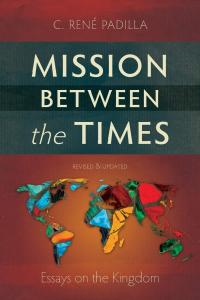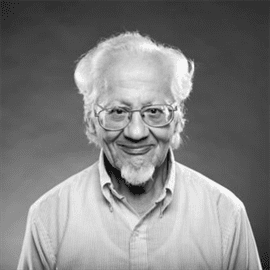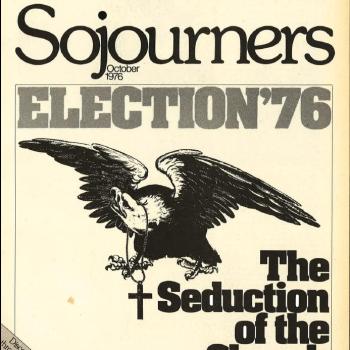 Today we welcome Dr. Nathan Cartagena, an Assistant Professor of Philosophy at Wheaton College. His teaching and scholarship focus on race, racism, critical race theory, military ethics, and Thomas Aquinas.
Today we welcome Dr. Nathan Cartagena, an Assistant Professor of Philosophy at Wheaton College. His teaching and scholarship focus on race, racism, critical race theory, military ethics, and Thomas Aquinas.
A Cosmic Awakening
I grew up with a truncated gospel. Pastors, youth leaders, and Sunday school teachers proclaimed the same message: “The gospel is the good news that Jesus died for sinners”—the end. Family members, whether Anglo or Boricua, repeated this creed. This was our common tongue.
It wasn’t until college that I realized my creedal tongue was deficient. Paul Kemeny, a former Grove City College professor, sparked this realization. During class, Kemeny denounced theories of salvation that focused solely on human beings for failing to acknowledge the Gospel’s cosmic scope. “These theologies can’t account for passages like Romans 8,” Kemeny declared. “They can’t account for God’s cosmic recreation or how humans relate to it. But that’s precisely what Paul does. Just listen to Romans 8.” We did.
For the creation waits in eager expectation for the children of God to be revealed. For the creation was subjected to frustration, not by its own choice, but by the will of the one who subjected it, in hope that the creation itself will be liberated from its bondage to decay and brought into the freedom and glory of the children of God. We know that the whole creation has been groaning as in the pains of childbirth right up to the present time. Not only so, but we ourselves, who have the first fruits of the Spirit, groan inwardly as we wait eagerly for our adoption to sonship, the redemption of our bodies. For in this hope we were saved. But hope that is seen is no hope at all. Who hopes for what they already have? But if we hope for what we do not yet have, we wait for it patiently. (vv. 19–25, NIV)
Kemeny stopped reading. I was stunned. Despite having made good on high-school commitment daily to read the Bible and theology, here I was, a sophomore in college, still learning the basics—still seeing things I had never recognized. This realization hurt. And the more I thought about it, the more my body shook. Then questions accompanied convulsions. “How had I not seen this passage? How had I missed Paul’s logic? Why hadn’t anyone taught me Paul’s cosmic Gospel? What else am I missing?” I keep these questions to myself. Like some fighting nausea, I refused to vomit up anguish. Instead, I committed to wholesale self-examination. Mine was a Socratic tune: “The unexamined life is not worth living.”
Becoming a Reformed Academic
I pursued self-examination within academia. At Grove City College, I double-majored in biblical theological studies and philosophy. After a gap-year, I completed an MA in philosophy at Texas A&M University. And longing to teach in a Christian liberal arts college, I earned a PhD in philosophy at Baylor. At each stage I resisted specialization by studying philosophy and theology. And at each stage resisted professionalization by committing myself to local churches. I understood that fragmentation stymies cross-situational awareness and development, and that self-examination requires wholeness and integrity.
I strove for wholeness, integrity, and self-knowledge within a Reformed ecology. From my freshman year in college to my final day at Baylor, I attended Presbyterian congregations. And I pitched my tent in modern and classic Reformed texts. Books by John Calvin, Tim Keller, and Abraham Kuyper populated my bookshelves; copies of the Westminster Standards rested on nightstands and coffee tables. So did texts on Reformed catholicity. As one seminary outlet explains, Reformed catholicity is “a catholic and Reformed approach to dogmatics seeks theological renewal through retrieval of the rich resources of the historic Christian tradition [sic].” Popularizers of this approach include Michael Allen, J. Todd Billings, Scott Swain, and John Webster. Reading their work persuaded me to join the Reformed catholic movement.
While I became Reformed catholic, my race consciousness began to surge. This unusual pairing arose from my continued practices of resistance against specialization, professionalization, and fragmentation. When I began studying at Baylor, I committed to developing competency in race scholarship to equip myself to teach multidisciplinary courses on race and racism. Here my research truly was me-search, for I craved resources that could render my racialized experiences intelligible—could make sense of what it is to be a son of Puerto Rico and the U.S. South. Combing through scholarship on race and racism proved to be more than I bargained for. It forced me to see and acknowledge a bitter conclusion: I harbored internalized racism and a colonial mentality. I saw myself as racially inferior, as less intelligent and gifted because I’m Puerto Rican, un hijo de Borikén. Similarly, I embraced idolatrous myths of U.S. benevolence and exceptionalism—myths designed to numb me and mi gente to our colonial status and the racism without and within. These were anti-Kingdom fruits. Stored in me and my family were the lethal consequences of militarism, the poison berries of empire. These are brutal truths to confront, and they never travel alone. Socratic self-examination required my asking a related, painful query: “How have my theological communities and reading practices reflected, tracked, or worsened my internalized racism and colonial mentality?”
If you go back two paragraphs, you’ll see that all the Reformed theologians I mentioned are White men. If you review their works, you’ll find that they rarely quote or engage—positively or negatively—authors and traditions that aren’t racialized White. Theirs is a markedly Eurocentric, settler colonial cannon. And their cannon was mine. Ideologically, I was far from myself and my peoples. Indeed, I hadn’t read a single theological text by a Latine except for The Story of Christianity by Justo González.
How to redress these trends and heal my colonial wounds? My answer has involved journeying with renowned Ecuadorian theologian C. René Padilla.
Another Awakening
Padilla became a mentor for me through his celebrated essay “Evangelism and the World.” The essay divides in two. Part one is the original manuscript that circulated before the Lausanne Congress (1974). Part two is a response to the critical feedback the original manuscript received. (Notes: Padilla read the latter at Lausanne I; for the entire text, see Mission Between the Times, Chapter 2). Together, these reflections offer a rich understanding of the Gospel, evangelism, and worldliness. And, for me, they provided a Kingdom reckoning.

Five paragraphs into the original paper, Padilla dropped a line that brought me back to Kemeny’s class: “A simple observation of the important place that the term world (Greek: cosmos) has in the New Testament…should suffice to demonstrate the cosmic dimension of the gospel. God’s work in Jesus Christ deals directly with the world as a whole, not simply with the individual.” My marginal note: “Amén.” Several pages latter, Padilla made my Reformed heart sing. “It is impossible to separate the priestly ministry of Jesus Christ from his kingly ministry.” My marginal note: “Yep.” I was feeling seen and affirmed. And, sad but true, I felt Padilla was “safe”—a Latine I could trust to articulate sana doctrina, “sound doctrine.” Then Padilla rocked my world.
In the original manuscript, Padilla identifies a form of anti-Kingdom “worldliness” he labels “the American Way of Life.” Padilla clarifies what this label means by quoting David Moberg.
A major source of the rigid equation of socio-political conservativism with evangelicalism is conformity with the world. We have equated Americanism with Christianity to such an extent that we are tempted to believe that people in other cultures must adopt American institutional patterns when they are converted. We are led through natural psychological processes to an unconscious belief that the essence of our American Way of Life is basically, if not entirely, Christian.
While reading Moberg’s comments, I chuckled in agreement. I stopped chuckling as I read Padilla’s subsequent commentary. “This equation [of the American Way of Life with Christianity] insures the presence of a large number of middle-class white people in the church.” Moberg said nothing about class; Padilla linked Moberg’s diagnosis to a specific racial and socioeconomic location. Spotting that link, I set down the essay. Padilla had named the class location of most of the churches I’d called home. For the first time in my life, a theologian had exposed my class privileges and prejudices, and I felt it.
Matters intensified as I turned to the essay’s second part. There Padilla dropped lines that jostled me awake from another unconscious theological slumber.
The Gospel of [American Way of Life Christianity] is a message of conformism, a message that, if not accepted, can at least be easily tolerated because it doesn’t disturb anybody. The racist can continue to be a racist, the exploiter can continue to be an exploiter, Christianity will be something that runs along life, but will not cut through it.
A truncated Gospel is utterly insufficient as a basis for churches…It can only be the basis for unfaithful churches, for strongholds of racial and class discrimination, for religious clubs with a message that has no relevance to practical life in the social, the economic, and the political spheres.
“The racist can continue to be a racist, the exploiter can continue to be an exploiter”—this line stung. My ecclesiastical communities and theological training had left my internalized racism and class prejudices unnamed and unchecked. No one had called me to repent of these evils, for I’d lived, moved, and had my being in “strongholds of racial and class discrimination.” Mine was still a theology of conformism, an ideology in service of exploitation and empire rather than the anti-imperial Kingdom headed by a poor, colonized, first-century Palestinian Jew. This same Jesus of Nazareth met me in Padilla’s essay. He asked me to share my pains, said it was okay to vomit up my anguish. Sensing him and his invitation, I asked God to set me free.

Still Reforming
I prayed for liberation and began journeying with C. René Padilla in spring of 2019. Since then, I have read and reread many of his essays and books, posted blogs celebrating his legacy, and shared his writing with my students. Each engagement con hermano Padilla has hurt and healed. Each has revealed me to myself. That’s what prophetic, Kingdom texts do: They serve as a mirror. And the Spirit who Jesus promised and sent frequently uses our looking into these mirrors to nurture our salvation.
These truths were on my mind when I agreed to write an essay for the Anxious Bench. For the day I received this invitation had provided me with an opportunity to see that I was growing but still needed to reform.
Mi familia y yo had spent an evening in Oak Park, Illinois. As it grew late, we headed to the train station to go home. At the foot of the ramp leading to the boarding platform was a multiracialized group of poor, rundown, disabled men and women. Racist and classed sensibilities started to surge throughout my body. But then I remembered hermano Padilla’s writings. I remembered how he and other Latine theologians had helped me to see Jesus of, with, and among the historic and present poor, beleaguered, and disabled. The same Jesus who sent the Spirit and employed Padilla’s writings to heal me of internalized racism and a colonial mentality was with and among these precious Brothers and Sisters. And he, through the Spirit, was liberating me from my discipled inability to see them or him.
Taking my seat on the train, I checked my email. There was an invitation to write for the Anxious Bench. I smiled. And then I remembered a line from “Evangelism and the World”: “Salvation is wholeness. Salvation is total humanization. Salvation is eternal life—the life of the kingdom of God—life that beings here and now…and touches all aspects of man’s [sic] being.” Echoes from Ecuador remind us that the God who dwells with the least of these is making all things new. Amén y amén.













